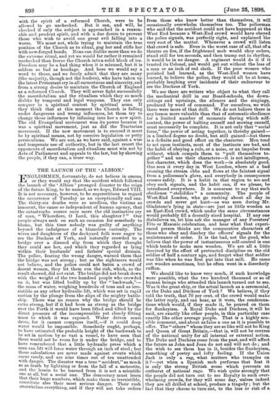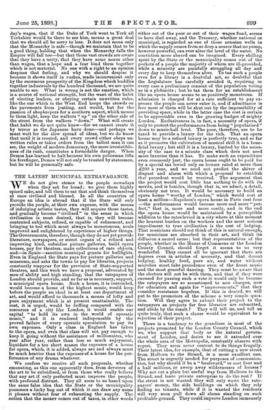THE LAUNCH OF THE ALBION.' E NGLISHMEN, fortunately, do not believe
in omens, or they would say that the accident which followed the launch of the Albion' presaged disaster to the reign of the future King, to be named, as we hope, Edward VIII. It is not necessary, however, to be superstitious to regard the occurrence of Tuesday as an exceptionally sad one. The thirty-six deaths were so needless, the victims so innocent, the cause so independent of human agency, that the catastrophe rouses once more the old instinctive cry of man, " Wherefore, 0 Lord, this slaughter ?" Our people always seek on such an occasion for somebody to blame, but this time nobody was guilty of anything beyond the indulgence of a blameless curiosity. The wives and daughters of the dockyard folk were eager to see the Duchess of York, and naturally crowded to a bridge over a disused slip from which they thought they could see her, and which they regarded as lying within their husbands' and fathers' special domain. The police, fearing the wrong danger, warned them that the bridge was not strong ; but as the sightseers would not believe, and the police could not baton a crowd of decent women, they let them run the risk, which, as the result showed, did not exist. The bridge did not break down with the weight of the two hundred people who crowded on it, but was lifted bodily up by the " backwash,"— the mass of water, weighing hundreds of tons and as irre- sistible as any other hydraulic lift, which was set in rapid motion by the plunge from the slips of the mighty battle- ship. There was no reason why the bridge should be extra strong, but if it had been as strong as the bridge over the Forth it would have been lifted and tilted by the direct pressure of the incompressible yet closely fitting mass to which it was exposed. Water driven must drive, for it cannot compress itself,—if it could deep water would be impossible. Somebody ought, perhaps, to have estimated the probable height of the backwash to be set in motion by so vast a vessel, to have seen that there would not be room for it under the bridge, and to have remembered that a little hydraulic press which a man can lift will force water through an inch of steel ; but those calculations are never made against events which occur rarely, and are nine times out of ten unattended with danger. The disaster was a true " accident," as much so as death by lightning or from the fall of a meteorite, and the lesson to be learned from it is not a scientific one at all, but a social one. The democracy must learn that their huge numbers, which make them so irresistible, constitute also their most serious danger. Their rush overwhelms everything, and if they will not take orders from those who know better than themselves, it will occasionally overwhelm themselves too. The policeman who said that the accident could not have happened at the West End because a West-End crowd would have obeyed the police signals, was perfectly right, and explained the very root of the matter. Whenever a crowd will listen that crowd is safe. Even in the worst case of all, that of a theatre on fire, if the frightened mob would obey orders, stand still for ten seconds, and then tramp out in rhythm, it would be in no danger. A regiment would do it if it trusted its Colonel, and would get out without the loss of a man or an inch of red cloth. If the poor women who perished had learned, as the West-End women have learned, to believe the police, they would all be at home, probably laughing over incidents of their endeavour to see the Duchess of York.
We see there are writers who object to what they call the mechanical drill in our Board-schools, the down- sittings and uprisings, the silences and the singings, produced by word of command. For ourselves, we wish there were more of that drill. We do not believe there is any lesson more valuable than that of automatic obedience for a limited number of moments during which self- control, the power of halting oneself and moving oneself, must necessarily be complete. It is not only that " social force," the power of acting together, is thereby gained— in a limited degree no doubt, but still gained—but there is a definite and good effect on the character. Men tend to act upon instincts, most of the instincts are bad, and the habit of obeying a rule, or a noise, or an impulse from without, which compels them to "pull themselves to- gether " and use their characters—it is not intelligence, but character, which does the work—is absolutely good. One sees it every day in West London, where at a bad crossing the stream ebbs and flows at the faintest signal from a policeman's glove, and everybody in consequence crosses safely. It is a habit in that region to see and obey such signals, and the habit can, if we please, be introduced everywhere. It is nonsense to say that such obedience " stolidifies " a community. The people of West-End London, who go rushing about all day in crowds and never get hurt—as was seen during Mr. Gladstone's lying in state—are just as little wooden as an East-End crowd, which under the same circumstances would probably fill a decently sized hospital. If any one disbelieves us, let him ask the manager of any Foresters' Fete or Masonic celebration, and hear what that experi- enced person thinks are the comparative characters of those who obey and disobey the officers' signals for the maintenance of order. It is the bad, not the good, who believe that the power of instantaneous self-control is one which tends to make men wooden. We are all a little deceived by the effect of protracted discipline on the old soldier of half a century ago, and forget what that soldier was like when he was first put into that mill. He came out wooden sometime; but he often went in a disorderly ruffian.
We should like to know very much, if such knowledge were possible, what the two hundred thousand or so of human beings who attended this launch turned out to see. Was it the great ship, or the actual launch as a ceremonial, or the Duke and Duchess of York ? We believe, if they told the truth, that 70 per cent. of the crowd would make the latter reply, and can hear, as it were, the condemna- tions which would, if they made it, be poured on them for flunkeyism. A Royal Duke and Duchess, it will be said, are exactly like other people, in this particular case exactly like other average people. That is a highly sen- sible comment, and about as false a one as it is possible to offer. The " others" whom they are so like will not be King and Queen of Great Britain,—that is, will not be centres of the national unity for all internal or external action. The Duke and Duchess come from the past, and will affect the future as John and Joan do not and will not do ; and the wish to see them has in it, besides the flunkeyism, something of poetry and lofty feeling. If the Union Jack is only a rag, what matters who tramples on it ?—yet when a Spanish mob performs that feat it is only the strong British sense which prevents an outburst of national rage. We wish quite strongly that the people did not turn out to see Royalty in such over- whelming crowds, for they will some day, unless indeed they are all drilled at school, produce a tragedy ; but the fact that they choose to turn out, to the loss or risk of a day's wages, that if the Duke of York went to York all Yorkshire would be there to see him, means a great deal that we should all be sorry to lose. It does not mean only that the Monarchy is safe—though we maintain that to be a good thing, holding that when the Monarchy falls the Empire will fall too—but that those vast crowds are aware that they have a unity, that they have some nexus other than wages, that a hope and a fear bind them together which is not material. No one with a right to an opinion despises that feeling, and why we should despise it because it shows itself in rushes, made inconvenient only by the enormous prosperity of the Kingdom which huddles together industrials by the hundred. thousand, we are quite unable to see. What is wrong is not the emotion, which is a source of national strength, but the want of the habit of electing leaders, or obeying certain unwritten rules, like the one which in the West End keeps the crowds on the pavements from jostling, and would, but for the passion of shopkeepers for a southern aspect, which means to them light, keep the walkers " up " on the other side of the street from the walkers " down." What will create that habit we do not quite know—for we cannot create it by terror as the Japanese have done—and perhaps we must wait for the slow spread of ideas, but we do know that until it is created, and every crowd either obeys un- written rules or takes orders from the tallest man it can see, the weight of modern democracy, the mere irresistible- ness of its rush, constitutes a formidable danger. When Demos has learned to halt because his own policeman lifts his forefinger, Demos will not only be trusted by statesmen, but he will be personally safe.



















































 Previous page
Previous page